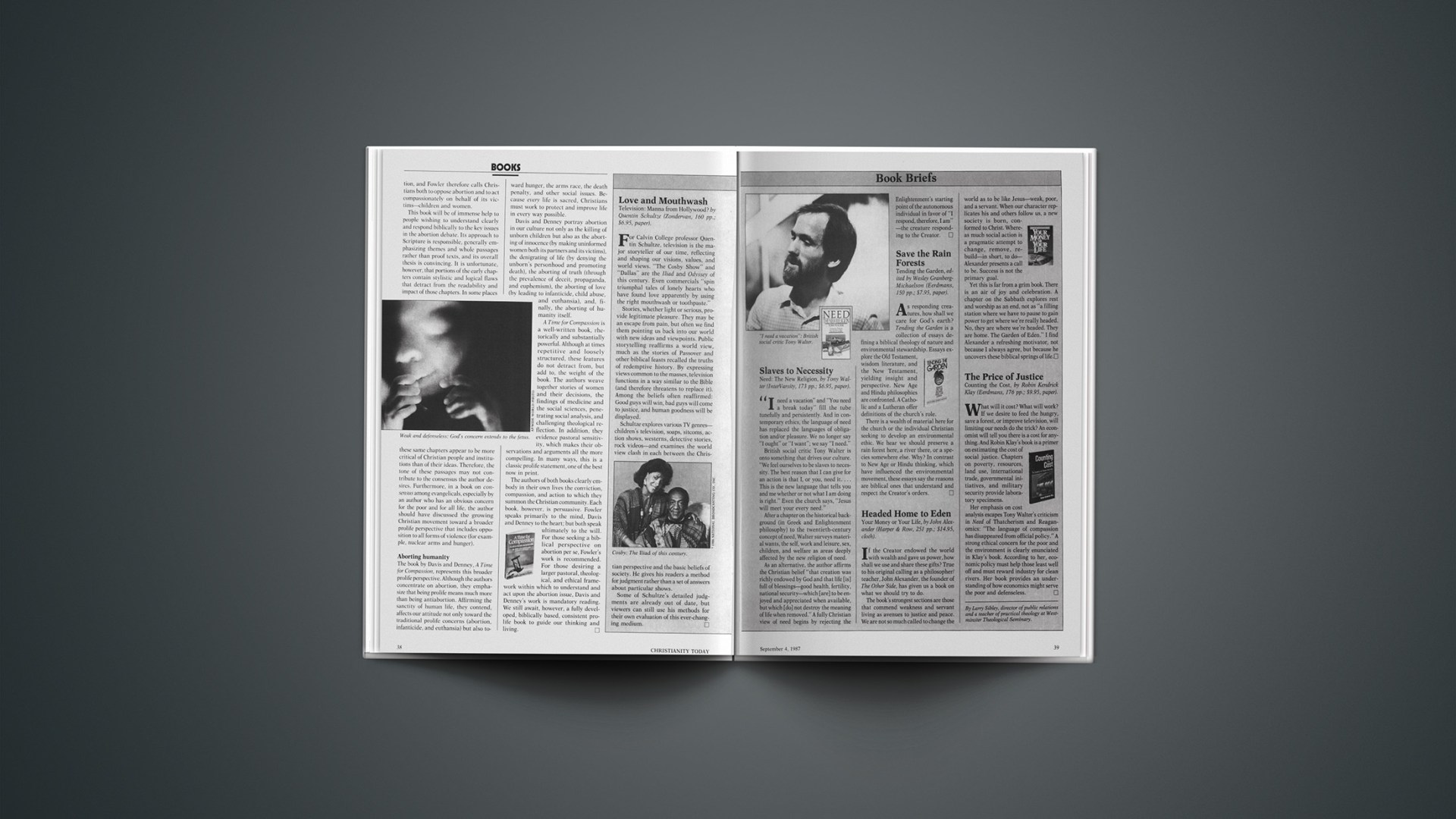Slaves To Necessity
Need: The New Religion, by Tony Walter (InterVarsity, 173 pp.; $6.95, paper).
“I need a vacation” and “You need a break today” fill the tube tunefully and persistently. And in contemporary ethics, the language of need has replaced the languages of obligation and/or pleasure. We no longer say “I ought” or “I want”; we say “I need.”
British social critic Tony Walter is onto something that drives our culture. “We feel ourselves to be slaves to necessity. The best reason that I can give for an action is that I, or you, need it.… This is the new language that tells you and me whether or not what I am doing is right.” Even the church says, “Jesus will meet your every need.”
After a chapter on the historical background (in Greek and Enlightenment philosophy) to the twentieth-century concept of need, Walter surveys material wants, the self, work and leisure, sex, children, and welfare as areas deeply affected by the new religion of need.
As an alternative, the author affirms the Christian belief “that creation was richly endowed by God and that life [is] full of blessings—good health, fertility, national security—which [are] to be enjoyed and appreciated when available, but which [do] not destroy the meaning of life when removed.” A fully Christian view of need begins by rejecting the Enlightenment’s starting point of the autonomous individual in favor of “I respond, therefore, I am”—the creature responding to the Creator.
Save The Rain Forests
Tending the Garden, edited by Wesley Granberg-Michaelson (Eerdmans, 150 pp.; $7.95, paper).
As responding creatures, how shall we care for God’s earth? Tending the Garden is a collection of essays defining a biblical theology of nature and environmental stewardship. Essays explore the Old Testament, wisdom literature, and the New Testament, yielding insight and perspective. New Age and Hindu philosophies are confronted. A Catholic and a Lutheran offer definitions of the church’s role.
There is a wealth of material here for the church or the individual Christian seeking to develop an environmental ethic. We hear we should preserve a rain forest here, a river there, or a species somewhere else. Why? In contrast to New Age or Hindu thinking, which have influenced the environmental movement, these essays say the reasons are biblical ones that understand and respect the Creator’s orders.
Headed Home To Eden
Your Money or Your Life, by John Alexander (Harper & Row, 251 pp.; $14.95, cloth).
If the Creator endowed the world with wealth and gave us power, how shall we use and share these gifts? True to his original calling as a philosopher/teacher, John Alexander, the founder of The Other Side, has given us a book on what we should try to do.
The book’s strongest sections are those that commend weakness and servant living as avenues to justice and peace. We are not so much called to change the world as to be like Jesus—weak, poor, and a servant. When our character replicates his and others follow us, a new society is born, conformed to Christ. Whereas much social action is a pragmatic attempt to change, remove, rebuild—in short, to do—Alexander presents a call to be. Success is not the primary goal.
Yet this is far from a grim book. There is an air of joy and celebration. A chapter on the Sabbath explores rest and worship as an end, not as “a filling station where we have to pause to gain power to get where we’re really headed. No, they are where we’re headed. They are home. The Garden of Eden.” I find Alexander a refreshing motivator, not because I always agree, but because he uncovers these biblical springs of life.
The Price Of Justice
Counting the Cost, by Robin Kendrick Klay (Eerdmans, 176 pp.; $9.95, paper).
What will it cost? What will work? If we desire to feed the hungry, save a forest, or improve television, will limiting our needs do the trick? An economist will tell you there is a cost for anything. And Robin Klay’s book is a primer on estimating the cost of social justice. Chapters on poverty, resources, land use, international trade, governmental initiatives, and military security provide laboratory specimens.
Her emphasis on cost analysis escapes Tony Walter’s criticism in Need of Thatcherism and Reaganomics: “The language of compassion has disappeared from official policy.” A strong ethical concern for the poor and the environment is clearly enunciated in Klay’s book. According to her, economic policy must help those least well off and must reward industry for clean rivers. Her book provides an understanding of how economics might serve the poor and defenseless.
By Larry Sibley, director of public relations and a teacher of practical theology at Westminster Theological Seminary.










